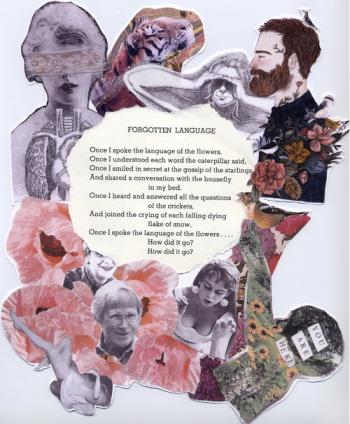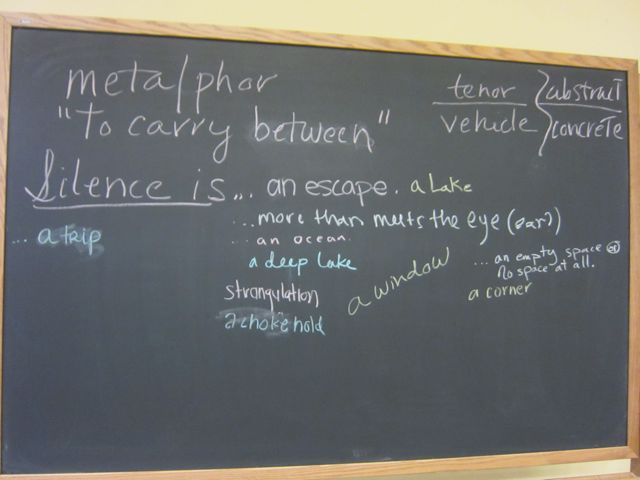Serendip is an independent site partnering with faculty at multiple colleges and universities around the world. Happy exploring!

Reclaiming Poetesses as Eco-feminist Figures

When I ran across the above image, the text of which is by children’s poet Shel Silverstein, I started thinking about when, exactly, we are able to break down the barrier between natural reality, and human expression of one’s perception of this reality. How do we go about recovering the language of the flowers, as Silverstein puts it?
In Wholeness and the Implicate Order, David Bohm suggests that we may be able to see a defragmentation in poetry. Poetry allows us to “overcome this fragmentation by using language in a freer, more informal, and ‘poetic’ way” (Bohm 34). The accuracy of this statement lies in the type of poetry analyzed.
Sonneteers such as Milton and Shakespeare typically used nature to describe the object of their affections. By attempting to use nature to as a descriptive, they stabilize both nature and the person they describe. They simultaneously define nature and their subject, settling both into a non-existent stability. Take, for example, the infamous Shakespearean sonnet, “Shall I compare thee to a summer's day?” In it, Shakespeare exclaims the beauties of his loved one, concluding the poem with the lines:
My Ecological Story
For our third Web Event I chose to expand the activity we did in class and answer some of the questions Carolyn Merchant poses. I think that the personal experience is the most valuable experience from which to draw on in an ecological class. The personal experience may not be shared by everyone, but it does highlight how each of our personal narratives is affected by someone else's thereby stressing the importance of interconnection.
Self in Society
“Consider your own family’s history and place in society going back at least to you grandparents’ generation. Were your ancestors native to this country? Are you or your parents first-, second-, or perhaps eighth-generation immigrants? What large events-wars, depressions, revolutions, social movements- shaped their lives? How did your families use the land and relate to nature? Which of their values have you absorbed? Which have you rejected? Think about the people you know and their family connections to the land” (Merchant, 1-2).

And now for a change of pace...
http://www.foxnews.com/opinion/2012/11/24/war-on-men/
While getting lost on the world wide webs I stumbled upon this... hm....Hard to believe it was written by a woman.
field notes 2
After I watched the girl sitting in front of me playing her online games all through the class, I started to doubt whether or not a computer class should be held in this loose tension. I have noticed from the very beginning of this placement that the teacher does not give any lectures and the class begins and ends in chaos as always. Is it because that this is a computer class which is not a traditional discipline course?
I interviewed the teacher afterwards and the teacher gave her answers as that first of all, many of students had already have those computer skills before they come into the class and secondly, sixth and seventh grade girls will probably not focus on her lecture for long.
In this classroom, there is no doubt that most of the students have access to computers and technical skills outside the class and according to the teacher, besides the transfer students, students in this school would receive the computer education from kindergarten. I agree that prosperous economic background of these students may bring them advantadges in utilizing computers but since if the kindergarten in this school has already provided the technique education, why the curriculum in middle school still stays in the same material? If the students were simply taking a break and surfing online randomly, school might need to reconsider the curriculum and the course arrangment, otherwise, the class would be a waste of time and resource.

Ecologically reworking American Politics and Its Dynamics
In my earlier web paper, Hurricane Sandy, the Rotunda, and Thomas Berry, I talked about how an unexpected power outage provided me with an experiential form of environmental education. Standing inside the pitch-black Haverford College’s KINSC rotunda made me analyze the college courses proposed by author Thomas Berry for educating future generations to be more mindful of humanity’s role in the environment. By examining several of Berry’s prescribed courses, I was able to put my real world experience inside the rotunda into an educational context, thereby growing as an ecological-minded student. But while I certainly felt that Berry’s lessons were helpful for environmental education, I concluded that his classroom based and structured courses were not effective enough. Rather, I advocated that a true environmental education should incorporate more real world and unplanned experiences so that students can be thrust into the natural surroundings and realize their importance to society.

Web Event: Culture, Class, and Environmental Closeness
My hometown recently released a magazine called "Grown." This is a town in which the class differences are extremely visible and most of the people that live here year-round are not really part of the higher ones, but most everything caters to the wealthy tourists and summer home owners. This magazine, apparently, caters to them, too. It discussed summer programs for high school students at sea, fundraisers for health food stores and local eating, and information about how to make a summer house more "green." No options were given to the many residents of the town that cannot afford these things. The wealthier members of Western society are given in forms like this easy ways to be environmentally-friendly and connect to the Earth, while the less wealthy are not. The less wealthy that do not happen to live in tourist towns with rich plant life do not even have the opportunity to.

Dinner Together in the City?
Dear 360'ers--
Barb, Jody and I would like to invite you to have dinner with us, to celebrate the conclusion of our
shared work together this semester (not to mention plotting some on-going connections and elaborations….?).
We're proposing that we do this @ 5 p.m. on Monday, Dec. 17, @ my place in center city.
We're going to order in, so please tell us what you'd like to (or cannot/will not) eat.
Getting yourself there would involve taking the R5 to Market East, then walking south
four blocks to 903 Clinton, 2R (it's just above 9th Street, between Pine and Spruce).
Let us know if you'd like to--and can!--make it?
Hopefully, and happily,
Anne (for us 3)



